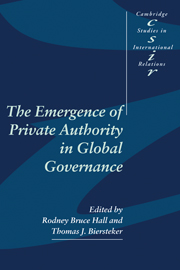Book contents
- Frontmatter
- Contents
- List of figures
- List of tables
- List of contributors
- Preface and acknowledgements
- Part I Introduction: theorizing private authority
- 1 The emergence of private authority in the international system
- 2 Private international regimes and interfirm cooperation
- Part II Market authority: globalization and “globaloney”
- Part III Moral authority: global civil society and transnational religious movements
- Part IV Illicit authority: mafias and mercenaries
- Part V Conclusions and directions
- Bibliography
- Index
- CAMBRIDGE STUDIES IN INTERNATIONAL RELATIONS
2 - Private international regimes and interfirm cooperation
Published online by Cambridge University Press: 22 September 2009
- Frontmatter
- Contents
- List of figures
- List of tables
- List of contributors
- Preface and acknowledgements
- Part I Introduction: theorizing private authority
- 1 The emergence of private authority in the international system
- 2 Private international regimes and interfirm cooperation
- Part II Market authority: globalization and “globaloney”
- Part III Moral authority: global civil society and transnational religious movements
- Part IV Illicit authority: mafias and mercenaries
- Part V Conclusions and directions
- Bibliography
- Index
- CAMBRIDGE STUDIES IN INTERNATIONAL RELATIONS
Summary
This chapter focuses on the development of private international regimes as institutionalized manifestations of private authority. Private international regimes may, of course, emerge in a number of issue areas and involve a multiplicity of non-state actors, as many of the chapters in this book illustrate. However, the focus here is specifically on the emergence of such regimes through the cooperation of firms, business and industry associations, and other corporate actors. This focus is significant because contemporary developments in domestic and global political economies are enhancing the authority of private institutions, actors, and processes. In many states, the privatization of government activities, the deregulation of industries and sectors, increased reliance on market mechanisms in general, and the delegation of regulatory authority to private business associations and agencies are expanding the opportunities for the emergence of private and self-regulatory regimes. Indeed, “[p]rivate actors are increasingly engaged in authoritative decision-making that was previously the prerogative of sovereign states.” Corporations, “singly and jointly, construct a rich variety of institutional arrangements that structure their behavior. Through these arrangements they can deploy a form of private authority whose effects are important for understanding not just the behavior of firms, but also for analyzing the state and its policies.”
The paper is less concerned with the nature of the relationship between private international regimes and states, although this is clearly a challenging and pressing concern which is addressed more generally in the concluding chapter.
- Type
- Chapter
- Information
- The Emergence of Private Authority in Global Governance , pp. 23 - 40Publisher: Cambridge University PressPrint publication year: 2002
- 30
- Cited by

